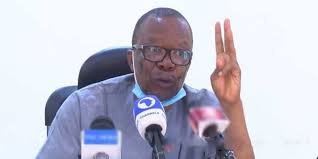"little progress has been made"---ASUU Pres.Osedeke speaks,as ASUU-FG Meet,inaugurates 4th negotiation committee

The Federal Government has inaugurated a seven-man Re-negotiation Committee on the 2009 Agreements with university-based unions, including the Academic Staff Union of Universities (ASUU) to resolve all the pending issues.
However, the National President of the union, Prof. Emmanuel Osodeke, revealed in an interview that the two-week ultimatum given to the government to meet its demands would also expire today.
He lamented that the negotiation committee would mark the fourth effort since 2017, with previous committees led by Wale Babalakin in 2017, Munzali Jubril in 2020, and Nimi Briggs in 2022.
He lamented that over the past seven years, little progress had been made, leading to concerns that these initiatives might be tactics to buy time rather than genuine attempts at resolution.
Some of the union demands included the release of revitalisation fund for universities; the release of earned allowances for lecturers, the deployment of the University Transparency Accountability System for the payment of salaries and allowances of university lecturers; an end to the proliferation of universities by government, and renegotiation of the ASUU-FGN 2009 agreement, among others.
Reflecting on past experiences, Osodeke said for the past seven years, the government had never responded to their demands.
He said after reaching an agreement in 2022, they received no communication from the government regarding implementation.
Osodeke said, This is the fourth committee in seven years, following those led by Wale Babalakin in 2017, Munzali Jubril in 2020, and Nimi Briggs in 2022.
“Despite these efforts, little progress has been made, leading us to question whether these initiatives are merely tactics to buy time. As a union, we are hopeful for real change this time around.
“In 2022, we reached an agreement, but since then, we have not heard from the government regarding its implementation. Let’s see what happens.”
The Minister of Education, Prof. Tahir Mamman, while inaugurating the committee, said it was tasked with producing a realistic and workable agreements that would holistically tackle the challenges confronting the Nigerian University System and reposition it to effectively play its very important role in national development.
He recalled that the re-negotiation of the 2009 agreements between the Federal Government and the university staff unions (ASUU, NAAT, SSANU, and NASU) commenced on Monday, February 13, 2017.
He said: “Regrettably, this had lingered for this long due to a number of unforeseen circumstances. However, it is important to state that the immediate past leadership of the Renegotiation Committee under Professor Nimi Briggs, produced draft report with significant areas covered, and agreed on that would be a spring board to hinge on going forward to conclude the exercise.
“There is no gain saying that the earnest desire of every stakeholder in the Nigerian University System (NUS) and, indeed, at large, is to conclude this re-negotiation exercise within the shortest possible period,” he said.The minister said the committee is to liaise and consult with relevant stakeholders to guide the position of the Federal Government on the issues in the draft proposed FGN/University based Unions Renegotiated Agreements.
Other terms of reference is to renegotiate in realistic and workable terms the 2009 Agreement with other university-based unions and recommend any other issue the committee deemed relevant to reposition the NUS for global competitiveness and
submit proposed draft agreements within three months from the date of inauguration.
The minister, however, noted that some of the issues had been resolved while they were working on others.
The Chairman of the Committee, Prof Yayale Ahmed, said the whole issue since the 2009 agreement, the unconcluded Nimi-Brigs agreement and other issues that affect and constrain the performance of the university system were well known over the years.
“Our committee will not be here just to reinvent the wheel. All the documents pertaining to this important issue are available. While some of us were privileged to be active participants over the years, never did I get a message that one day I would come after seven years to relive what we have tried to do over the years,” he said.
Prof Ahmed who is the Chairman of the Committee of Pro-Chancellors said
the task should be based on patriotism and sincerity of purpose.
“You mentioned that the 2009 agreement may not and does not appear to be fully
implementable. We would like it reviewed. Therefore, seeking the cooperation of ASUU and other unions to reflect and review as the current circumstances may demand,” he said.
He appealed to the federal ans state governments to ensure that universities reflected the kind of authority and honour minimally required to compete internationally.
To ASUU, he said “I still recall my appeal to you in 1998. I said, can you please initiate and develop an alternative to strikes so that we do not lose the beauty of educating our children, but at the same time we always make our points very clear that the federal government or the state government will know that we are not joking.
“I am appealing to us and all the other unions that we are here to learn from you and as messengers of the federal government, take your message and return with positive replies in a very short time.”
In his remarks, the President of ASUU, Prof Emmanuel Osodeke prayed that the new committee should not be like all the previous committees which have failed to resolve all the issues.
He said they spent over two years talking, with nothing to show for it.
“We are all already for renegotiation.
We will provide all the documents for the committee to look at it and if there are issues we will start from there.
“We love this country and must all ensure that we work together to have it when the children of the President, Senators and Ministers will be in the same classroom with the children of their drivers and farmers as it used to be in the 60s,” he said.






















